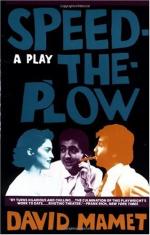|
This section contains 147 words (approx. 1 page at 400 words per page) |

|
In this essay, Weales reviews Speed-the-Plow, comparing it to Mamet's other works. While he found the play mean-spirited and often ugly, the critic admits his appreciation for the playwright's facility with dialogue.
In Thomas Morton's Speed the Plough (1800), the most famous character is Mrs. Grundy, whose name became a synonym for British respectability, and she never appears at all. In David Mamet's Speed-the-Plow, the most pervasive character is also offstage: the American movie audience. As in Morton' s play, where characters are constantly guessing what Mrs. Grundy would think, Mamet's Hollywood hacks, who have their commercial credibility rather than their reputations to lose, assume that they know what will bring the moviegoers to the boxoffice: what brought them there last week. Their low estimate of the public is confirmed by the weekly listing of movie grosses; in the most recent Friday the Thirteenth topped
|
This section contains 147 words (approx. 1 page at 400 words per page) |

|




